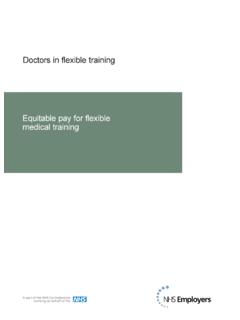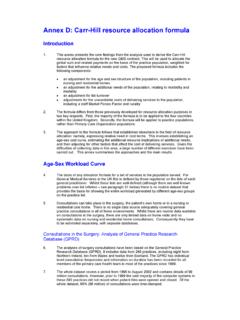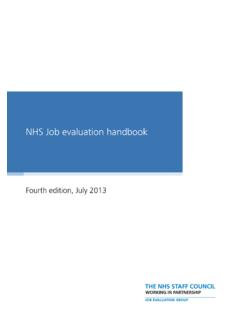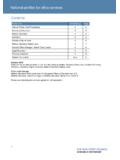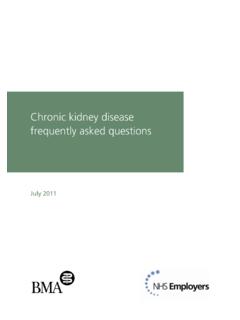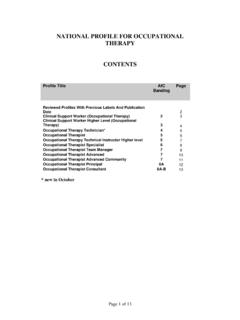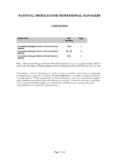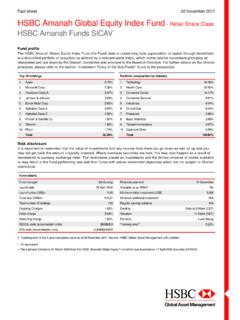Transcription of SUMMARY OF 2018/19 GENERAL MEDICAL …
1 SUMMARY OF 2018 /19 GENERAL MEDICAL SERVICES AGREEMENT This note sets out a SUMMARY of the key changes to the GENERAL MEDICAL Services (GMS) contract in England for 2018 /19. These changes have been agreed between NHS Employers, on behalf of NHS England and the GENERAL Practitioners Committee (GPC) of the British MEDICAL Association (BMA).Contract upliftThe contract for 2018 /19 will see an investment of million, which is an overall increase of per cent. This additional investment is to uplift the contract and to take into account other agreed changes, covering: An investment of 60 million to cover GP indemnity costs for 2017/18 An uplift to allow an increase to the Item of Service (IoS) fee for certain vaccination and immunisations (V&I) from to , in line with consumer price index inflation An uplift of 22 million to allow a change in the value of a Quality and Outcomes Framework (QOF) point as a result of a Contractor Population Index (CPI) adjustment A non-recurrent investment of 10 million to recognise additional workload associated with the implementation of e-Referral contractual requirements.
2 This investment will be added to the global sum allocation with no out-of-hours (OOH) deduction applied. Funding to cover indemnity payments is unweighted. All other uplift payments are on a weighted will provide a one per cent uplift to pay and a three per cent uplift to expenses in line with consumer price index inflation. A further uplift may be made following the Government s response to any recommendations by the Review Body on Doctors and Dentists remuneration (DDRB). The DDRB recommendation is expected in May 2018 March 2018 SUMMARY of 2018 /19 GENERAL MEDICAL Services agreement2 MARCH 2018 SUMMARY OF 2018 /19 GENERAL MEDICAL SERVICES AGREEMENTThe maximum figure practices can be reimbursed for locum costs will increase by one per cent, along with other changes to locum reimbursement set out below. Indemnity costs There will be a non-recurrent investment of 60 million, paid in March 2018 , to cover the increased costs of indemnity for the year 2017/18.
3 This will be distributed directly to practices, mirroring the arrangements for the indemnity payments made in March England and GPC have agreed to work constructively on any contractual implications of a state-funded scheme for indemnity which will cover all GPs (contractors, salaried, locums and trainees) and all practice staff for NHS Costs DirectionsNHS England and GPC have recently agreed changes to the 2013 Premises Costs Directions. It is recognised that there is a need to undertake a further review of premises used to provide primary MEDICAL care in England. This review (to commence by the early summer of 2018 ) will also address some outstanding issues from the review of the Premises Costs premises review will include, but not be limited to, helping to ensure that premises used for primary MEDICAL care are fit for purpose into the future bearing in mind likely service and other developments, and that they promote the recruitment and retention of GP contractors as well as representing value for money.
4 The review will also provide a better picture of the overall position on primary care estates and help to ensure better integration of services into the future. The review will be led by NHS England and the Department of Health and Social Care (DHSC) working with GPC and other key stakeholders, and will be underpinned by as clear an understanding of the evidence base as can be collated. It is likely to take six months and will make recommendations on next steps as soon as possible. The recommendations will be taken into account in any further national premises bookingGPC has noted NHS England s stated intention that direct booking by clinicians from 111 CAS (clinical assessment service) into practice systems should be rolled out universally as soon as possible. GPC also notes that potential benefits and implications of direct booking into practice systems for patients and practices will be demonstrated as this work progresses.
5 Over the next year, NHS England and GPC will work together to support further use of 111 direct booking where agreed with practices, to fully evaluate benefits and address any concerns about its implementation and potential consequences. Lessons learned, and the solutions reached, will inform a discussion in the 2019/20 contract negotiations. AdvertisingNHS England and GPC agree that NHS-commissioned practices must not advertise private providers of GP services which the practices should be providing free of charge on the NHS. NHS England and GPC will work together, supporting the local clinical commissioning group (CCG) and Local MEDICAL Committee (LMC), to ensure this does not happen. If necessary, this will be reinforced by a contractual clarification for 2019 2018 SUMMARY of 2018 /19 GENERAL MEDICAL Services agreement3 Electronic prescription serviceRegulations will be amended1 to implement electronic prescription service (EPS) Phase 4, allowing an initial phase of implementation to support a planned roll-out during 2018 /19.
6 The pharmaceutical regulations will also be amended to cover all pharmacists as patients may go outside of the area to get their prescription. The initial phase of implementation is yet to be agreed but it is anticipated to include a limited selection of practices. It will be important to learn the lessons from the initial phase to ensure that issues identified are resolved, to enable practices to be properly supported where they have implementation challenges. An NHS patient awareness campaign (including resources to help practices to manage patient concerns) will be undertaken to ensure patients are aware of the changes and to reduce any burden on practices in this regard. There will be a local fall-back process if the system is not operational and NHS England and GPC have also agreed to explore how secondary care providers might begin to make use of the EPS system to benefit e-Referral serviceThe target for this programme is to have all health systems using the NHS e-Referral Service (e-RS) for all their practice to first, consultant-led outpatient appointments, from October 2018 and to have switched off paper referrals.
7 Where paper switch off has been achieved, practices will be expected, through a contractual change, to use e-RS for these referrals from October. The national e-RS programme continues to support local systems in delivery of e-RS by October 2018 . Latest utilisation figures are 62 per cent for December 2017. Utilisation varies across local health economies and in some areas is lower than others. Programme resources are supporting these areas with their local project delivery. Some, but not all providers are ready and all have plans in place. From now until October, the e-RS team will work closely with CCGs and practices to target support for primary care and practices. Where there are concerns from local GPs, the CCG will meet with them, to listen and understand those concerns and jointly develop and deliver action plans to address any issues. In addition, the national e-RS implementation team is working on national products to raise awareness and understanding of e-RS.
8 These include guidance which has been co-created with GPC, as well as videos and training materials, which outline the different ways practices can implement e-RS including what support can be given by other members of the practice , NHS England s approach to e-RS implementation will be a supportive one with any contractual action being a last resort. Where a practice is struggling to use e-RS, there would be a contractual requirement to agree a plan between the practice and CCG to resolve issues in a supportive way as soon as will not be penalised if e-RS is not fully implemented in their locality, for example where services are not available to refer into or IT infrastructure is incapable of delivering an effective platform. These system-wide issues will be dealt with, including listening to and working with practices and GPs in the area who will be kept involved in agreeing any revised paper switch off the majority of practice referrals are now already being made by e-referral, NHS England is aware that there is still concern by some GPs about aspects of e-RS rollout and the implications for practices.
9 Therefore, a major part of the implementation approach will be to work with local systems, including those practices, to clarify this, resolve the issues and support their adoption of e-RS. NHS England and GPC are committed to work together to continuously improve the referral process and to deliver an ever more efficient and effective system that minimises workload for the practice. NHS England will work with GPC to conduct a post-implementation review to identify implementation challenges, including any workload implications, and this will inform the next round of contract negotiations. Contractual changes1 Changes to regulations are expected in October 2018 March 2018 SUMMARY of 2018 /19 GENERAL MEDICAL Services agreement4 MARCH 2018 SUMMARY OF 2018 /19 GENERAL MEDICAL SERVICES AGREEMENTV iolent patientsRegulations already allow practices to refuse registration where there are reasonable grounds for doing so, and NHS England and GPC have agreed that a violent patient flag against a patient record would constitute reasonable grounds.
10 Regulations will also be amended to allow a practice which has mistakenly registered a patient with a violent patient flag to be able to deregister that patient by following the same procedures for removing patients from a practice list who are violent. Where patients are removed under violent patient provisions, further care will be managed in line with agreed national policies, including where appropriate special allocation schemes. Patient access to online servicesThere will be a contractual change so that practices that have not achieved a minimum of 10 per cent of patients registered for online services online ordering of repeat prescriptions, online appointment booking or online access to patient records will work with NHS England to help them achieve greater use of those online services. Out-of-hours key performance indicators The National Quality Requirements (NQR) will be replaced with new key performance indicators (KPIs).
